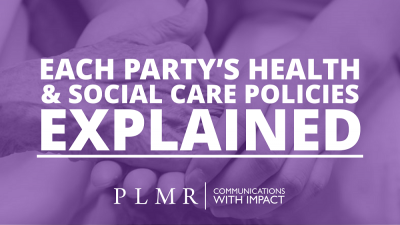Regardless of your age, social care is one of the biggest issues of our time. The current and future funding of care, and the interaction between care services and the NHS, will have a fundamental impact on us all, regardless of whether we personally use social care services or not.
With the General Election taking place against the backdrop of a profound social care crisis – more than 1.2 million elderly people with an assessed care need without a care package; ‘bed-blocking’ at an all-time high; and the sector facing an unprecedented funding shortfall in the face of rising demand and complexity of needs – the three main parties have outlined very different visions for the future of social care in the UK.
The Conservatives
In her manifesto – and it is very much Theresa May’s manifesto as the raised eyebrows from the right of her party attest to – the Prime Minister identified ‘five giant challenges’ that she will look to address. An ageing society, and providing older people with the care they need whilst being fair to the younger generations, came in at number four. Riding high in the polls and on course for a possible 150 seat majority, May has presented an honest – and likely quite unpopular – series of proposals. Firstly, the Winter Fuel Allowance will be means tested, removing £300 from the wealthiest pensions to be transferred “directly to health and social care” – the presumption is this will be ringfenced, additional money, but there are no guarantees.
Secondly, and at the heart of her proposals, is that the means-testing threshold for care funding will quadruple to £100,000, but the value of your house will now count towards this assessment for domiciliary care (it always has for care home placements). No one will be forced to sell their home in their lifetime, or their partner’s lifetime, but costs will be recovered from their estate after death.
May has clearly placed the onus for paying for social care on the individual themselves, only committing to protect up to £100,000 of wealth to be passed on as inheritance. This leaves many facing the possibility of substantial, almost uncapped care costs. It’s a distinct move away from the previously accepted Dilnot recommendations, and the ‘safety net’ of pooled risk that the NHS and private insurance has provided. Indeed, without a cap on care costs, it is now even more unlikely that a private insurance market to cover care costs will be created. Dilnot himself was rather scathing, saying, “people will be left helpless, knowing that what will happen is that if they are unlucky enough to suffer the need for care costs they will be entirely on their own.”
Whilst far more people will now be paying for their own domiciliary care, the raising of the means-testing threshold means that some care home residents will now find themselves funded by the state. For providers this poses a potentially serious threat – with such a sudden change affecting thousands of people across the country, will Councils be able to cope with this sudden increase in the number of funding requests?
This decision also raises the inherent unfairness of the health and care system in the UK – a cancer or heart disease diagnosis leads to entirely free treatment; a dementia diagnosis does not. Whilst May’s proposals are billed as a long-term solution, I’d expect these proposals to be revisited within a decade, not least because the unfairness argument will increasingly come to the fore – last year, for the first time, more people died from Alzheimer’s than cancer.
Update, Monday 22nd May – Four days after launching her manifesto, and having endured a bruising weekend of critique, May was forced to effectively ‘U-Turn’ – or as the party spinners called it, ‘issue a clarification’ – on her social care policy by announcing that the Conservative’s would, after all, include a cap on lifetime care costs.
As George Osborne, now Editor of the London Evening Standard said, “The Tory manifesto has only just come out, and already it is being rewritten. Just as well, really, that this manifesto wasn’t written on a tablet of stone.”
For families, and many Tory candidates knocking on doors, this will be welcome news. A cap will help families plan for potential future care costs and how they will meet them, as well as increasing the likelihood of private ‘care insurance’ products coming to market.
However, the change of approach raises several issues. Firstly, it is a distinct change in approach. The original proposals were quite progressive, guaranteeing minimum wealth (£100,000) to pass on, whilst not ‘lumbering’ the young and the poor with paying higher lifetime taxes to fund the care of wealthy pensioners. A cap, by contrast, places part of the funding burden back on those who can’t afford their own care. As Health Secretary Jeremy Hunt said, a cap isn’t “fair” to general taxpayers of this.
Secondly, and more importantly, where will the money come from to fund this new announcement? The original plan did not include – and therefore did not ‘cost-in’ – a cap. After four days of bad press, the government – or more precisely local Councils – will now have to fund those who have reached the cap regardless of whether they still have more than £100,000 of assets. This is potentially a multi-billion pound blackhole (Cameron’s proposed £72,000 cap would have cost the government £2bn a year on a lower means-testing threshold). There is, therefore, perhaps a touch of irony that one of the Conservative’s main attack lines against Labour is their proposals don’t add up.
Furthermore, research published by Royal London earlier that day showed that many Councils were already failing to enter into deferred payment agreements, despite the fact such a policy was already in place. The Conservative’s plans revolve around an expansion in the use of deferred payment schemes, yet no information has been provided to show how Council’s will be able to pay an individual’s care fees in the period before they can claim back the money from their estate after death.
The Labour Party
Often considered the custodian of the NHS, the Labour Party under Jeremy Corbyn have set a very different vision for the future of care services. Like May they have also abandoned the previously accepted Dilnot recommendations. However, unlike May, Corbyn would retain the current means testing threshold of £23,350. At the core of Labour’s plan is to provide an additional £8bn of funding for social care over the lifetime of the parliament, paid for by substantial increases in taxation on corporations and the wealthiest in society. That’s a lot of money just for social care, far and above the £2bn-odd shortfall predicted to occur by 2020 if nothing changed.
For providers, under Corbyn’s plan local authorities should be able to pay the fair cost of care, bring stability to the market, albeit relatively temporarily as there are no long term structural reforms meaning such levels of central-funding would need to be maintained to shore-up the system.
Corbyn would also work towards the introduction of a National Care Service – with a £3bn a year budget – that would work with the NHS to deliver a “shared requirement for single commissioning, partnership arrangements, pooled budgets and joint working arrangements.” The £3bn NCS funding would also, according to Labour, be “enough to place a maximum limit on lifetime personal contributions to care costs and raise the asset threshold.”
This all sounds very good, until one notices that Labour’s manifesto, despite claiming to be fully costed, includes the quite important caveat that, “we will seek consensus on a cross-party basis about how [the National Care Service] should be funded.”
Should the polls be dramatically wrong, and Corbyn sweeps to power on 9th June to implement this programme, I’d similarly expect these plans to be revisited within the decade unless Labour commits to ever increasing taxation to fund a social care system bracing itself for a doubling in need over the next 15 years. Whilst pooled-risk for the very poorest is present, most in society will be left funding their own care. The same arguments of cancer vs Alzheimer’s – as predicted above under the Conservatives’ proposals – would also likely rear their head.
The Liberal Democrats
Over the last seven years, the Liberal Democrats have consistently championed the need to increase investment in the NHS and social care systems. Under Care Minister Paul Burstow and then Norman Lamb, both of whom have remained champions of mental health and social care services once they left ministerial office, the Liberal Democrats have long sought to increase taxation to be reinvested specifically into the health system.
And behold, under Farron such a proposal is at the heart of their plans for the health and social care system in a Lib Dem yellow world. Farron would put ‘a penny on income tax’ – in reality a 1% increase for all, equating to hundreds of pounds per year for every tax payer – with the predicted £6bn revenue raised ringfenced for health and social care. The ‘and’ is important here, as the Lib Dems propose a raft of improvements to the NHS as well, particularly in mental health, meaning there is a very real risk that the revenue raised will be insufficient to fully fund their proposals on both sides of the health debate.
The Lib Dems are also the only party committed to delivering Dilnot’s proposed cap on care costs – although they don’t say at what level – and will deliver full integration by 2020. In the interim, and to ensure that health and care services receive the funding they need, an independent body will be set up to advise on the required budgets, based on the model of the Office for Budget Responsibility. A new ‘Health and Care Tax’ will also be introduced, potentially linked to national insurance, to provide further dedicated funding for the fully integrated care system.
In many ways, the Lib Dem’s proposals for social care are the most complete – individual risk is capped; services are funded through a dedicated tax; and government spending on health and care will be effectively dictated by an independent body (or risk facing the public backlash). Yet, the Lib Dems have committed to not forming a coalition, and even page 4 of the manifesto admits that Theresa May will win the election. Therefore – quite oddly – the Lib Dems’ proposals have been written with a view to never being delivered.





